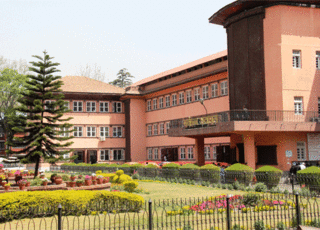Administrative law is the division of law that governs the activities of administrative agencies of government. Government agency action can include rule making, adjudication, or the enforcement of a specific regulatory agenda. Administrative law is considered a branch of public law.

The High Court of Justiciary is the supreme criminal court in Scotland. The High Court is both a trial court and a court of appeal. As a trial court, the High Court sits on circuit at Parliament House or in the adjacent former Sheriff Court building in the Old Town in Edinburgh, or in dedicated buildings in Glasgow and Aberdeen. The High Court sometimes sits in various smaller towns in Scotland, where it uses the local sheriff court building. As an appeal court, the High Court sits only in Edinburgh. On one occasion the High Court of Justiciary sat outside Scotland, at Zeist in the Netherlands during the Pan Am Flight 103 bombing trial, as the Scottish Court in the Netherlands. At Zeist the High Court sat both as a trial court, and an appeal court for the initial appeal by Abdelbaset al-Megrahi.

In English law, natural justice is technical terminology for the rule against bias and the right to a fair hearing. While the term natural justice is often retained as a general concept, it has largely been replaced and extended by the general "duty to act fairly".
In United States constitutional law, a Due Process Clause is found in both the Fifth and Fourteenth Amendments to the United States Constitution, which prohibits arbitrary deprivation of "life, liberty, or property" by the government except as authorized by law.
The Supreme Court of Ireland is the highest judicial authority in Ireland. It is a court of final appeal and exercises, in conjunction with the Court of Appeal and the High Court, judicial review over Acts of the Oireachtas. The Supreme Court also has appellate jurisdiction to ensure compliance with the Constitution of Ireland by governmental bodies and private citizens. It sits in the Four Courts in Dublin.
Giles v. Harris, 189 U.S. 475 (1903), was an early 20th-century United States Supreme Court case in which the Court upheld a state constitution's requirements for voter registration and qualifications. Although the plaintiff accused the state of discriminating in practice against black citizens, the Court found that the requirements applied to all citizens and refused to review the results "in practice," which it considered overseeing the state's process. As there was no stated intent in law to disenfranchise blacks, the Court upheld the state law.

The Supreme Court is the final court of appeal in the United Kingdom for all civil cases, as well as for criminal cases originating in England, Wales and Northern Ireland. It also hears cases of the greatest public or constitutional importance affecting the whole population.

Irish nationality law is contained in the provisions of the Irish Nationality and Citizenship Acts 1956 to 2004 and in the relevant provisions of the Irish Constitution. A person may be an Irish citizen through birth, descent, marriage to an Irish citizen or through naturalisation. The law grants citizenship to individuals born in Northern Ireland under the same conditions as those born in the Republic of Ireland.

The Supreme Court of Nepal is the highest court in Nepal. It has appellate jurisdiction over decisions of the seven High Courts and extraordinary original jurisdiction. The court consists of twenty Justices and one Chief Justice.
In law, the standard of review is the amount of deference given by one court in reviewing a decision of a lower court or tribunal. A low standard of review means that the decision under review will be varied or overturned if the reviewing court considers there is any error at all in the lower court's decision. A high standard of review means that deference is accorded to the decision under review, so that it will not be disturbed just because the reviewing court might have decided the matter differently; it will be varied only if the higher court considers the decision to have obvious error. The standard of review may be set by statute or precedent. In the United States, "standard of review" also has a separate meaning concerning the level of deference the judiciary gives to Congress when ruling on the constitutionality of legislation.
Denaturalization or citizenship deprivation or citizenship revocation is an involuntary loss of citizenship. Denaturalization can be based on various legal justifications. It can be a penalty for actions considered criminal by the state, often only related to nationality law or the naturalization process, such as the original act of naturalization is found to be invalid, for instance due to an administrative error or if it had been based on fraud or bribery.

Suresh v Canada is a leading decision of the Supreme Court of Canada in the areas of constitutional law and administrative law. The Court held that, under the Canadian Charter of Rights and Freedoms, in most circumstances the government cannot deport someone to a country where they risk being tortured, but refugee claimants can be deported to their homelands if they are a serious security risk to Canadians.

Baker v Canada , [1999] 2 SCR 817 is a leading Canadian administrative law decision of the Supreme Court of Canada. The Court provided guidance on the standard of judicial review of administrative decisions. The issue was what standard of procedural fairness should be applied when considering the judicial review of the waiver of the requirement that applications for permanent residence be filed from abroad. The case also clarified the need for written reasons in some administrative decisions.

Canadian administrative law is the body of law that addresses the actions and operations of governments and governmental agencies in Canada. That is, the law concerns the manner in which courts can review the decisions of administrative decision makers such as a board, tribunal, commission, agency or Crown minister, when he or she exercises ministerial discretion.
Judicial review is a part of UK constitutional law that enables people to challenge the exercise of power, often by a public body. A person who feels that an exercise of power is unlawful may apply to the Administrative Court for a court to decide whether a decision followed the law. If the court finds the decision unlawful it may have it set aside (quashed) and possibly award damages. A court may impose an injunction upon the public body.

Council of Civil Service Unions v Minister for the Civil Service [1984] UKHL 9, or the GCHQ case, is a United Kingdom constitutional law and UK labour law case that held the royal prerogative was subject to judicial review.

United Kingdom administrative law is part of UK constitutional law that is designed through judicial review to hold executive power and public bodies accountable under the law. A person can apply to the High Court to challenge a public body's decision if they have a "sufficient interest", within three months of the grounds of the cause of action becoming known. By contrast, claims against public bodies in tort or contract are usually limited by the Limitation Act 1980 to a period of 6 years. Almost any public body, or private bodies exercising public functions, can be the target of judicial review, including a government department, a local council, any Minister, the Prime Minister, or any other body that is created by law. The only public body whose decisions cannot be reviewed is Parliament, when it passes an Act. Otherwise, a claimant can argue that a public body's decision was unlawful in five main types of case: (1) it exceeded the lawful power of the body, used its power for an improper purpose, or acted unreasonably, (2) it violated a legitimate expectation, (3) failed to exercise relevant and independent judgement, (4) exhibited bias or a conflict of interest, or failed to give a fair hearing, and (5) violated a human right. As a remedy, a claimant can ask for the public body's decisions to be declared void and quashed, or it could ask for an order to make the body do something, or prevent the body from acting unlawfully. A court may also declare the parties' rights and duties, give an injunction, or compensation could also be payable in tort or contract.
Ali Charaf Damache is a citizen of Algeria and Ireland who was the first suspected terrorist to be extradited to the US during the Donald Trump presidency. He was alleged to have been the ringleader of a cell tasked with killing Lars Vilks, a Swedish artist some Muslims accused of blasphemy for having drawn the Islamic prophet Muhammad in a cartoon.

AAA & Anor v Minister for Justice & Ors, [2017] IESC 80, was an Irish Supreme Court case which arose from the judgment delivered by Cooke J in the High Court on 17 May 2012, due to the fact that the applicant AAA and her children were deported to Nigeria in 2011. The court held that "as a rule" there is no right to an oral hearing in an application for leave to remain on humanitarian grounds and subsidiary protection where there has already been oral hearings in relation to an application for asylum. This decision clarified the grounds under which a claim for subsidiary protection could be heard.

Begum v Home Secretary [2021] UKSC 7 is the short name of three closely connected proceedings considered together in the Supreme Court of the United Kingdom, R v Special Immigration Appeals Commission; R v Secretary of State for the Home Department; and Begum v Secretary of State for the Home Department, concerning Shamima Begum, a woman born in the United Kingdom who at the age of fifteen travelled to Syria to join the Islamic State of Iraq and the Levant (ISIS). Her intention to return to England in 2019 resulted in a public debate about the handling of returning jihadists.










